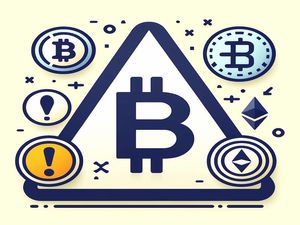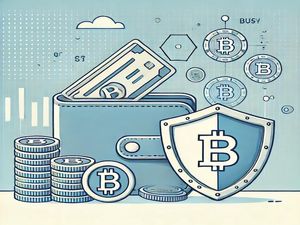Phishing Scams #
What It Is #
Phishing scams aim to steal your personal information such as passwords, private keys, or credit card details. Scammers create fake websites or emails that mimic well-known cryptocurrency exchanges or wallets. They trick users into entering their details on these fake platforms.
Example #
A scammer might send an email claiming to be from your cryptocurrency exchange, warning you of an account issue and providing a link to resolve it. The link leads to a fake website that looks identical to the real one. When you enter your credentials, the scammers gain access to your account and steal your funds.
How to Protect Yourself #
- Verify URLs: Always check that the URL matches the original site and watch for subtle changes in spelling or additional characters.
- Use Bookmarks: Bookmark important cryptocurrency sites to avoid mistyping URLs.
- Install Antivirus Software: Keep your antivirus software updated to protect against harmful links and files.
- Enable Two-Factor Authentication (2FA): Activate 2FA on all cryptocurrency accounts for an added layer of security.
Initial Coin Offering (ICO) Scams #
What It Is #
ICO scams involve fraudulent projects that offer new tokens in exchange for investments. These fake projects promise high returns with glossy websites, convincing presentations, and fabricated reviews.
Example #
A scam ICO might claim to have groundbreaking blockchain technology. They launch a detailed white paper and a robust marketing campaign, attracting significant investments. Once they reach their fundraising goal, the team disappears, leaving investors with nothing.
How to Protect Yourself #
- Review the White Paper: Ensure the project provides a well-written, detailed white paper.
- Check the Team: Verify the legitimacy of the project team by checking their LinkedIn profiles and social media presence.
- Be Wary of Unrealistic Promises: Avoid projects that offer unrealistic returns or revolutionary technology without substantial proof.
Pyramid and Ponzi Schemes #
What It Is #
These schemes promise high returns from investments made by new participants. The returns paid to early investors come from new investments rather than actual profits. Once recruitment slows, the scheme collapses, leaving most investors with losses.
Example #
A Ponzi scheme might present itself as an investment fund offering a daily return of 1%. Initial investors receive their promised earnings, but when new investments dry up, the scheme fails.
How to Protect Yourself #
- Be Skeptical of High Returns: If a project promises high and consistent returns without clear explanations, it’s likely a scam.
- Verify Licenses and Regulatory Documents: Ensure the project is properly licensed and regulated.
- Research the Project’s History: Investigate the project’s background and the reputation of its founders.
Fake Airdrops and Token Giveaways #
What It Is #
Scammers offer free tokens or cryptocurrencies in exchange for completing tasks or making a small deposit. Once you comply, they disappear with your money.
Example #
A scam might offer free tokens in exchange for registration or social media actions. After you complete these tasks and make a small deposit to activate your account, the scammer vanishes with your funds.
How to Protect Yourself #
- Verify Airdrops: Check the legitimacy of airdrops through official project channels.
- Avoid Deposits: Legitimate airdrops do not require any financial investment.
- Protect Personal Information: Never share your private keys or personal details for participation in airdrops.
Market Manipulation #
What It Is #
Scammers manipulate market prices through coordinated trading activities or spreading false information. Common strategies include pump-and-dump schemes and spreading hype through fake news.
Example #
A group of traders might artificially inflate the price of a cryptocurrency by making large purchases, attracting other investors. Once the price peaks, they sell off their assets, causing the price to plummet and leaving other investors with losses.
How to Protect Yourself #
- Analyze the Market: Conduct thorough research and avoid reacting to hype or panic.
- Avoid Suspicious Communities: Steer clear of trading groups that promote get-rich-quick schemes.
- Diversify Investments: Spread your investments to reduce risks and potential losses.
Fake Wallets and Apps #
What It Is #
Scammers create counterfeit wallets or apps designed to steal your cryptocurrencies. These apps may appear legitimate but contain malicious code that sends your private keys to the scammers.
Example #
A fake wallet app might look like a genuine cryptocurrency wallet but actually transfers your private key to the scammers when you enter it.
How to Protect Yourself #
- Download from Trusted Sources: Only install apps from official app stores or trusted sources.
- Check Reviews: Examine app reviews and ratings for signs of scams.
- Verify Developers: Ensure the app’s developer has a reputable background.
Identity Theft #
What It Is #
Scammers use various methods to steal your identity and private keys, such as malware attacks or fake mining programs. These attacks can lead to unauthorized access to your cryptocurrency holdings.
Example #
Malware might be used to capture your private keys or sensitive information from your computer, leading to the theft of your cryptocurrencies.
How to Protect Yourself #
- Use Strong Passwords: Create and regularly update strong passwords.
- Download from Trusted Sources: Avoid apps and files from untrusted sources.
- Regularly Update Software: Keep your operating system and antivirus software up-to-date.
- Consider Hardware Wallets: Use hardware wallets for storing large amounts of cryptocurrency for enhanced security.
By understanding these common scams and following the recommended precautions, you can significantly reduce your risk of falling victim to cryptocurrency fraud. Stay informed, be cautious, and protect your investments.
For more insights on cryptocurrency and investment strategies, check out our other videos and articles. Stay safe and happy investing!











